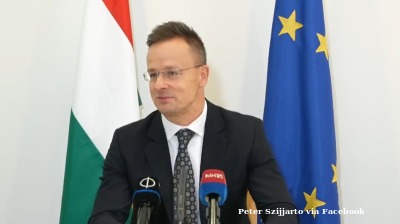Nato invited Macedonia on July 11 to start accession talks with the Alliance, and once it implements the name deal with Greece it can join Nato as its 30th member state.
The invitation was announced at the first day of the Nato summit in Brussels. It was expected after the country concluded the historic name deal with Athens, which sets a new name for the country – Republic of North Macedonia – and solves the long-standing dispute between the two neighbours. Previously Nato member Greece had blocked Macedonia's accession to the Alliance.
“We warmly welcome last month’s historic agreement between Athens and Skopje and today we agreed to invite the government of Skopje to start accession talks,” Nato secretary general Jens Stoltenberg said.
Stoltenberg added that, “once all national procedures have been completed to finalise the name agreement the country would join Nato as our 30th member.”
The invitation will be formally handed to Prime Minister Zoran Zaev on July 12.
The pre-accession process is expected to last six to 18 months.
The deal with Greece, concluded in June, unlocked Macedonia’s Euro-Atlantic integration processes as the country's accession was previously vetoed by Greece due to the unresolved dispute.
Greece objected to the use of the name Macedonia as it has a province with the same name in the north, fearing possible territorial claims by Skopje.
For the deal to be implemented, Macedonia needs a yes vote in a referendum that will probably be held at the end of September or early October.
However, this is not expected to be an easy process as the opposition and the country’s President Gjorge Ivanov are adamantly against the name deal, claiming it is unlawful and unconstitutional.
Under the deal, Skopje needs to make constitutional changes to change the country’s name to North Macedonia, which will be used not only internationally, but also at home.
Zaev and senior government officials consider the deal will keep the country's national identity and even strengthen it, and EU and Nato accession will open a better future for its citizens.
Zaev is convinced that the referendum will be successful and that most citizens will vote for the changes, as around 75% of citizens are in favour of Nato membership, according to polls.
The deal also has to be approved by the Greek parliament, which will be another difficult step as the opposition there is also against the deal, because it does not want the word "Macedonia" to be included in the country’s new name at all.
Macedonia was invited to start Nato accession talks as Former Yugoslav Republic of Macedonia (FYROM), an acronym used so far for the country due to the Greek objection to international institutions calling the country by its constitutional name.
Greece used its veto to block Macedonia from being invited to join Nato at the Bucharest summit in 2008, but Skopje did not stop its preparations for joining the Alliance. But it was only after the appointment of a new government in May 2017 that serious efforts were made to find a solution with Greece.
Macedonian Defense Minister Radmila Sekerinska recently said that the government has adopted the Strategic Defense Review, a document on the long-term development of the Macedonian army. This is a key document for the defense sector and its alignment with Nato standards.
According to the plan, the Macedonian army will have 6,800 soldiers. It foresees a budget for the army of 2% of GDP until 2024, up from the current 1% of GDP.
In June, EU leaders also gave the green light for Macedonia and for Nato member Albania to start accession talks, pending progress on reforms prior to the launch of negotiations in June 2019.
The name deal was signed by the foreign ministers of Macedonia and Greece Nikola Dimitrov and Nikos Kotzias on June 17 in Prespes, on the Greek side of Prespa lake.
The Macedonian-Greek dispute, which emerged after Macedonia declared independence from former Yugoslavia back in 1991, concerns Greece’s objection to the use of the name Macedonia. Athens feared that newly independent Macedonia might claim territories gained by Greece following the Second Balkan war in 1913. The Greek province of Macedonia spans most of the territories of the ancient kingdom of Macedon, and for more than five centuries it was part of the region known as Macedonia within the Ottoman Empire.
Meanwhile media reported that Greece will expel two Russian diplomats after evidence was found that Russia was trying to foment opposition to the historic Greek-Macedonian name deal. Moscow was informed about the move on July 6.
Allegedly the Russian diplomats were encouraging rallies in Greece to oppose the name deal, including offering bribes to opponents of the agreement. The Russian authorities said they will respond in kind to the move.
With Slovenia, Croatia, Albania and Montenegro as well as Bulgaria and Romania already being Nato members, and the presence of the Alliance with its peacekeeping mission in Kosovo, the invitation to Macedonia to join will leave only Serbia and Republika Srpska, one of the two entities in Bosnia & Herzegovina, open to Russian influence in the Balkans.
News
_Foto2_Divulgação_Foresea_(1)_1761062969.jpg)
Petrobras secures controversial Amazon drilling licence ahead of COP30 climate summit
Brazil's Petrobras has obtained authorisation to drill an exploratory well near the mouth of the Amazon River, sparking fierce criticism from conservationists just weeks before Brazil hosts UN climate talks.
_1761050969.jpg)
Revolut clears final hurdle for Mexico banking debut
Revolut has received final authorisation from Mexico's banking regulator to commence operations, positioning the London-based fintech to launch services within weeks.

Hungary to challenge EU’s ban on Russian gas imports, vows to block REPowerEU
Hungarian Foreign Minister Peter Szijjarto says the European Council’s decision to ban Russian fossil fuel imports by 2027 could jeopardise Hungary’s energy security.

Slovak Foreign Minister Blanár reiterates support for Ukraine’s EU bid
Juraj Blanár says Ukraine is "ready in a way" for accession, but notes objections from some EU member states.




